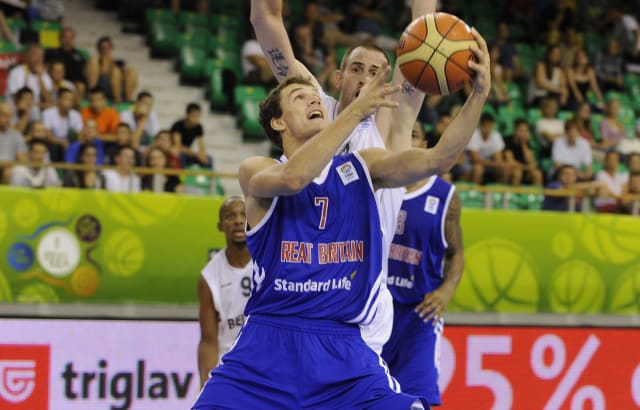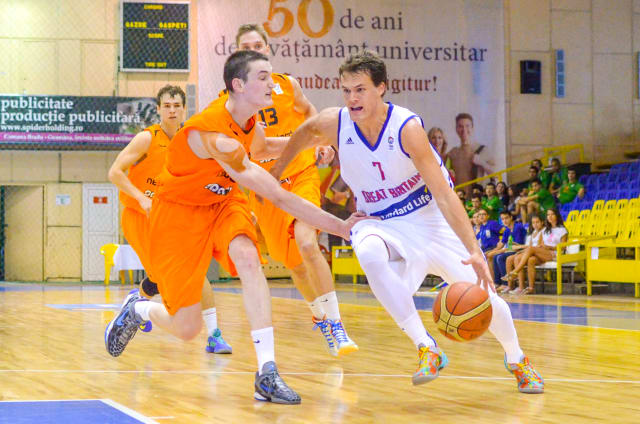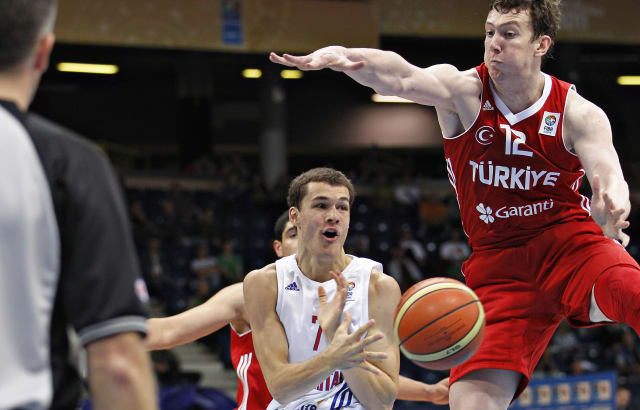The curious case of Devon Van Oostrum: from elite prospect to New Hero
DEN BOSCH (FIBA Europe Cup) – If you were to turn back the clock five years, Devon Van Oostrum might be one of the hottest names in Europe. No longer a star on the rise, he's out to prove himself.
DEN BOSCH (FIBA Europe Cup) – If you were to turn back the clock five years, Devon Van Oostrum might still be one of the hottest names in European basketball. No longer a star on the rise, the 25-year-old point guard is itching to remind the continent about himself.
Having roamed all over Europe before an unfortunate knee injury left him sidelined for over a year, the player opted for a fresh start with the New Heroes Den Bosch in a place he can call home. Despite being better known as a standout for Great Britain national teams of various age groups, it is by no means a coincidence that Van Oostrum ended up back in the Netherlands.
Ahead of the start of the FIBA Europe Cup campaign with his new club, the player opened up to FIBA.basketball.
We sat down with Van Oostrum to talk about his oft forgotten all-Dutch background and a carefully thought-out decision to reboot his career in Den Bosch, while also reflecting on the unique and as tantalizing ever career arc that is still waiting for the big breakthrough.
"I want to show that all the potential people said I had, that it is still there and that I can still play at a high level. And that those expectations were not false."
It's been a while since we saw you on the court. What has your summer looked like, preparing for the comeback?
What has my summer been like? My whole year, really, has been the same. I started the 2016-17 season in Greece, then went to Skopje and that's where I tore my ACL. Ever since then, I've been recovering, rehabbing and doing a lot of lifting. Basically, in the gym all the time. I just had to take a year out. I didn't want to rush back and play for two months at the end of the [next] season. It didn't really seem like the smart option. It's just been about recovering and getting used to my leg again and trying to feel like a player again.
How are you physically right now; are you ready to roll?
I'm definitely ready to roll. The only thing that is missing is game rhythm, as I haven't played in some time. But in terms of being healthy and in terms of strength, it's better than before. It's definitely better than before.

Van Oostrum has two FIBA EuroBasket tournaments under his belt, having played in 2011 and 2013
You signed the contract with Den Bosch back in July. How did that move come about and what were the main reasons for choosing the club as your next stop?
After taking a year out, I knew I was going to have to take a step back, realistically. I know where my ambitions are and where I want to play but, given the circumstances, I wanted a place where there was structure. I wanted a place where I knew I was going to get my money on time, where I knew I wouldn't have any problems with my living situation and also somewhere where I also had an opportunity. For me, the opportunity comes with the FIBA Europe Cup and stability comes in a country like the Netherlands. Those were my two main reasons.
You were born in Groningen; you hold dual citizenship; your younger brother Sam played for the Dutch youth team. Can you tell people more about your Dutch connection and why you represented England and Great Britain instead?
I was born in the Netherlands and we were basically raised as Dutch kids. Both of my parents are Dutch, so we're a very common Dutch family if anything. My mom is part Indonesian as well, but that's part of Dutch colonial history. It's all very Dutch. We moved to England because of my father's job, as he's an American Literature professor at the university. And I ended up in Sheffield when I was 5 or 6 years old. We moved to England and settled over there, while the rest of our family – my aunties and uncles – is all in the Netherlands. We all speak Dutch at home, but we just followed my dad and ended up living in England for a long time. Because I lived there and I was so young, it was easier to play for England. So that's how that came about.
"It's definitely been one of the hardest years of my life with the injury and how it happened."
How big of an impact did being Dutch have in terms of going to Den Bosch? One might say you'll be back home in a way…
That's why I really liked the option in Den Bosch. It's definitely been one of the hardest years of my life with the injury and how it happened. To come back kind of home, where it all started. Because I do feel like I'm starting my career all over again, starting from scratch. And I thought what better place to start than here in Holland, where it all began.
Your older brother Nigel has played in the Dutch Basketball League for a number of years now. How much did you talk to him before inking with Den Bosch?
The Dutch league goes on for quite a while. And because I finished the season quite early the last couple of years, I tried to come and watch a few of Nigel's games. I'm very familiar with the Zwolle organization that he plays for – it's great. I think that played a huge part as well. I think it's a very Dutch-oriented team and I think that's the case with all the teams throughout the Netherlands. They're all very open-minded, kind and polite, very helpful and organized. I think that carried over, when I signed with Den Bosch as well. Ultimately, I chose Den Bosch because of the club's president. I had a very good relationship with him and his ambitions were matched with mine. That's why Den Bosch was the team that I tried to go to.
🌍🏀 | Onze spelverdeler Devon van Oostrum vertelt waarom hij niet kan wachten op de FIBA Europe Cup clash tegen BC Balkan!
— New Heroes 🏀 (@NewHeroesBB) September 4, 2018
Heb jij nog geen tickets? Volg dan snel deze link 👉 https://t.co/EWaeFYEkyn#BetterEveryDay pic.twitter.com/fTdVwmRyOZ
Dutch basketball is doing well internationally with the national senior and youth teams, and there’s exciting talent. And in terms of the domestic league, while there were only nine teams, Donar carried the international torch and the league is competitive; there’s a new team coming in called Dordrecht, who will be solid. Obviously, because we now play in the FIBA Europe Cup, ZZ Leiden play in the FIBA Europe Cup, Donar Groningen are in the Basketball Champions League, it's a league that has become even stronger this year. I'm glad to be a part of that.
In the press release announcing your signing, you were saying that the chance to play in the FIBA Europe Cup was also a big factor. How much did the international competition impact your decision?
In the younger age groups, I've done very well. Professionally, I've been solid, but have not had the same impact as I did at youth level. Here, they are giving me that same opportunity and the fact that I also get to do that in Europe is an opportunity that I can't pass on. For me, I see FIBA Europe Cup, Basketball Champions League, EuroLeague and EuroCup and I think it just adds something to a player's perspective. You get to play two games per week.
Playing just one game a week is a struggle sometimes – you're in the gym practicing all the time. If you lose, you have to wait the whole week to kind of make up for it, essentially. With two competitions, there's a lot going on, it's never the same. You never get stuck in a routine and you get to travel around Europe. It doesn't feel like you're sitting in the same place all the time. There's a lot changing, a lot of movement, which I think is good for an athlete.
"I'm a very different person and player than who I was as an 18-year-old with a 7-year contract."
Can you talk about how you are viewing the Qualification Round 1 tie against BC Balkan and how important it is for you to make the Regular Season?
I think the Qualifiers are [the main thing] on our mind at right now. It's just two games. You win on aggregate and then you're in the Group Phase. Whoever we would have got in the draw, I think we would look at it the same way. We just have to win, it's as simple as that. It's a do-or-die game, both games are going to be crucial. Playing away, especially against these kind of teams, it's going to be tough. Our main goal right now is to get through the Qualification Round.
Taking one step back and looking at the broader picture – the Netherlands will be your seventh different country in your career after England, Spain, Croatia, Finland, Greece and the Former Yugoslav Republic of Macedonia. That's quite a lot for a 25-year-old. On the one hand, how have these experiences helped you? And on the other, how nice would it be to settle down somewhere for a longer period of time?
Obviously, I had a very long contract with Baskonia. During the years, it was very hard to find the appropriate level and a team where I could play, because EuroLeague was a huge jump up. We made a few mistakes with the loaning situation. I hold a lot of blame to that too and I think they will admit some as well. It was a big learning curve.
That's basically another reason why I came to the Netherlands – that sense of stability and the opportunity they wanted to give me. That's why I see this as a new beginning for me. Don't get me wrong, everything that has happened in the past, moving around all these teams and stuff, I'll use that to my benefit. I'm a very different person and player than who I was as an 18-year-old with a 7-year contract.
 Van Oostrum averaged 26.8 points, 6.2 rebounds and 4.9 assists at the FIBA U20 European Championship 2013, Division B en route to promotion and MVP honors
Van Oostrum averaged 26.8 points, 6.2 rebounds and 4.9 assists at the FIBA U20 European Championship 2013, Division B en route to promotion and MVP honors
You were a stand-out at youth level, winning an MVP award at the U20 level and getting multiple All-Star Five selections during the years. What would you consider the highlight of your career, either internationally or with a club?
I would probably say the year, when we finished second in the FIBA U20 European Championship 2013, Division B, won promotion and I got the MVP and later went on to play at EuroBasket 2013 in Slovenia. We beat Germany, we beat Israel, lost to Belgium by five points. That's when I was nominated for the FIBA Europe Young Player of the Year award. I think that definitely was kind of special… Especially as it happened at U20 level after I went through the ranks of U16, U18. Until then, we had always just missed out on promotion, lost in the Semi-Finals or Quarter-Finals. It was my first ever Final and getting promotion in my last youth tournament was very memorable for me.
That impressive play hasn't really translated at senior level. Do you ever think about some would've, could've, should've moments in your career or are you trying not to look at the past too much?
Going forward, I'm seeing it as a clean piece of paper and as a new beginning. But I also know my experiences. There are many things that I would have done differently in terms of my level of maturity when I was younger, being able to fight through tough moments. I did have a lot of expectations and they were kind of thrown upon me. It's not that I didn't like that, but I kind of overdid it by putting a lot of pressure on myself by thinking 'the way I play in my youth, I'm going to play on my club team' and that's not how it works. Everyone has their role and you kind of have to integrate to fit that role. It took me a long time to figure that out.
"I want to play like I did in the youth days. I want to dominate, I want to play free, I want to begin to enjoy myself."
I think in my last two years in Greece, I started to figure that out a little bit. In Macedonia, things were going really well and then the injury happened. I think I'm along the right lines now. Obviously, when your role increases, you adapt. I think that was my main thing – I wanted to be what everybody expected and I wanted to be as successful as I was in my youth days, when – realistically – that wasn't my role on the teams that I was a part of. That affected me a lot, when I started bouncing around teams. It really got to me.
The fact that Baskonia trusted me and gave me a long contract, wanted me to be one of their point guards of the future… I didn't know how to handle myself on the bench. I got very frustrated with myself, I got very down on myself after the highlight of my career, which was the U20 European Championship, EuroBasket and FIBA Young Player of the Year nomination. And then to sit the whole year on the bench, I felt that was probably the hardest moment of my career, rather than this year with the injury.
 Van Oostrum driving past Turkey star Omer Asik at FIBA EuroBasket 2011
Van Oostrum driving past Turkey star Omer Asik at FIBA EuroBasket 2011
Many people found about you at FIBA EuroBasket 2011, when you were one of the youngest players in the entire competition. What are your memories from that event?
That was the first time that I played with Luol Deng, Joel Freeland. These are the veterans, the big names from England. To be on the court with those guys and learn from them [was special]… I also got the opportunity to play as well. I played big minutes against Turkey, I played against Spain too. I was playing in Spain at that time and I got to play against Pau [Gasol], Ricky [Rubio], Marc Gasol – all these big names. It's not something that I take for granted, it doesn't happen to many 18-year-olds. It's something that I do keep with me.
To end the interview, rather than focusing on the past, let's finish with a look to the future. What would be your one big goal or wish for the season ahead?
Our goal… We want to make the Group Phase, make it as far as possible in the FIBA Europe Cup. And it terms of domestic competition, we want to win everything. I think that's where our mind should be. Personally, I want to play like I did in the youth days. I want to dominate, I want to play free, I want to begin to enjoy myself and I want to show that all the potential people said I had, that it is still there and that I can still play at a high level. And that those expectations were not false.
FIBA